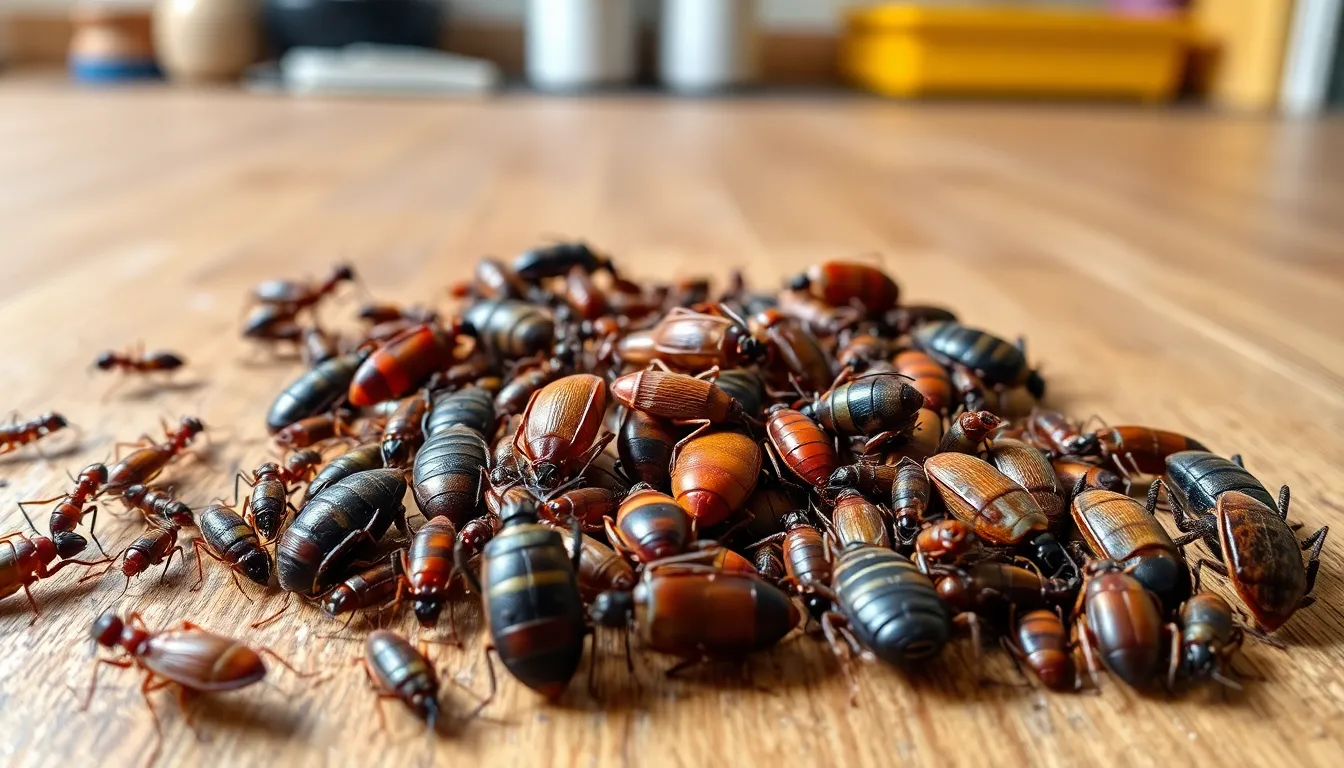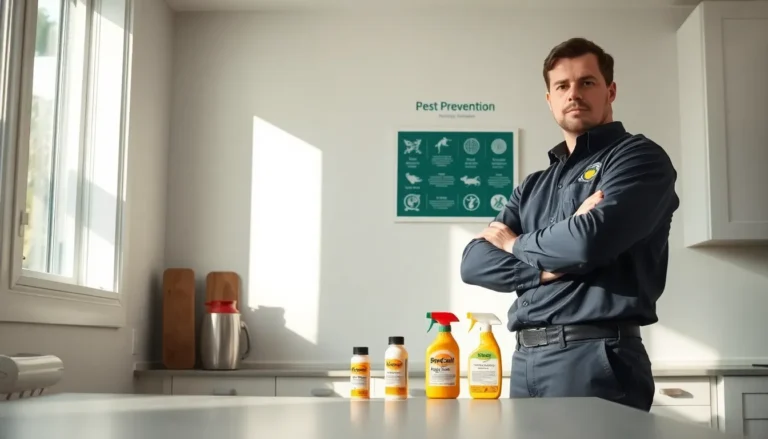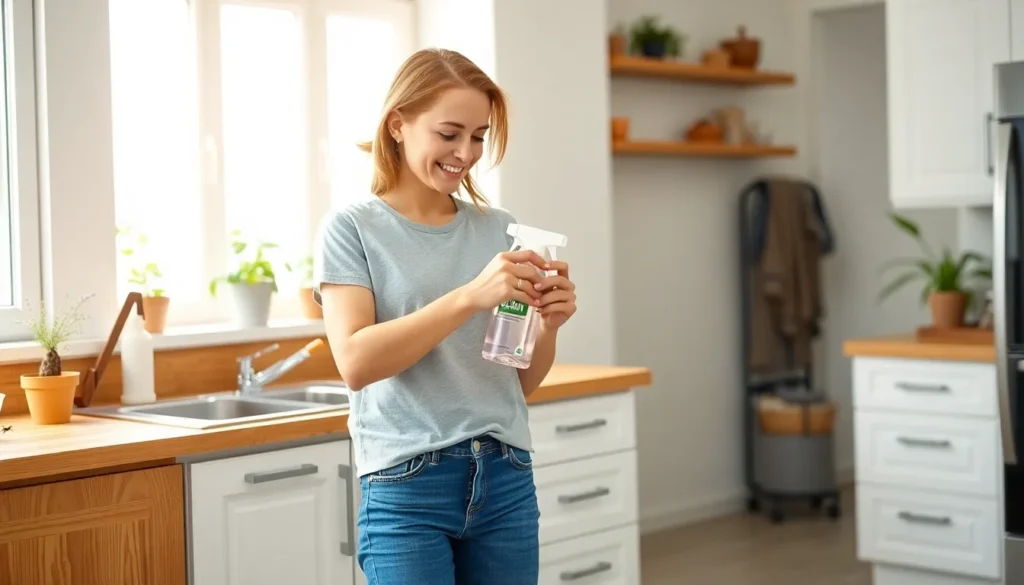Table of Contents
TogglePicture this: you’re lounging on the couch, popcorn in hand, when suddenly a tiny intruder scuttles across the floor. That’s right, pests don’t care about your movie night. Whether it’s ants marching like they own the place or cockroaches auditioning for a horror flick, they can turn a cozy home into a creepy crawly nightmare.
But fear not! Pest control at home doesn’t have to be a daunting task. With the right strategies, you can reclaim your space and send those unwanted guests packing. From simple DIY tricks to professional solutions, keeping your home pest-free can be both effective and entertaining. So, let’s dive into the world of pest control and discover how to keep your home a sanctuary rather than a buffet for critters.
Importance Of Pest Control At Home
Pest control plays a crucial role in maintaining a healthy home. It prevents infestations of harmful insects and rodents, which can threaten health. Common pests like ants, cockroaches, and rodents often carry diseases, posing risks to family members. A clean living environment is essential for overall well-being.
Efficient pest control protects property from damage. Termites and other pests can cause structural issues that lead to expensive repairs. Homeowners often underestimate this risk, but proactive measures help in avoiding significant financial burdens.
Implementing pest control methods fosters peace of mind. Knowing that the home is safeguarded from unwanted invasions allows residents to relax. A pest-free home enhances comfort for families and guests alike.
Regular pest control measures contribute to better air quality. Infestations can lead to allergens that exacerbate respiratory issues. Addressing pest problems not only eliminates nuisances but also promotes a healthier atmosphere.
Pest control is an essential aspect of home maintenance. Prioritizing pest management ensures a safe, comfortable, and welcoming environment for everyone. It mitigates health risks, protects property, and promotes an overall sense of well-being.
Common Household Pests

Households often face challenges from various pests that invade living spaces. Identifying these pests helps initiate effective control measures.
Insects
Insects, including ants, cockroaches, and bed bugs, frequently invade homes. Ants tend to form trails, leading to food sources, while cockroaches prefer dark and moist areas. Bed bugs hide in mattresses and furniture, causing discomfort during sleep. These insects not only disrupt daily life but also pose health risks, as many are carriers of diseases. Implementing targeted insect traps, sealing entry points, and maintaining cleanliness can significantly limit their presence.
Rodents
Rodents like mice and rats frequently infiltrate homes in search of food and shelter. Mice are small and can squeeze through tiny gaps, while rats are larger and often cause more substantial damage. Both rodents can transmit diseases, contaminating food and surfaces. Using traps, sealing holes, and ensuring proper food storage are effective strategies to control rodent populations. Regular inspections can help homeowners catch infestations early, minimizing potential health hazards and property damage.
Methods Of Pest Control
Multiple effective methods exist for controlling pests at home. These approaches vary in technique and application, ensuring that homeowners can choose the best option for their needs.
Chemical Control
Chemical control involves using pesticides to eliminate pests. Various types of pesticides target specific pests, including insecticides for insects and rodenticides for rodents. Homeowners must apply these products according to label instructions to ensure safety and effectiveness. Effective chemical control methods include sprays, baits, and foggers, which can quickly reduce pest populations. Precautionary measures, such as wearing gloves and masks during application, enhance safety. Furthermore, integrating chemical control with other methods maximizes results while minimizing risks.
Biological Control
Biological control utilizes natural predators or pathogens to manage pest populations. This method encourages the use of beneficial organisms, such as ladybugs to combat aphids or nematodes to target soil pests. Homeowners can introduce these agents into gardens and homes for eco-friendly pest management. Examples of biological control include introducing parasitic wasps that lay eggs in pest larvae or applying fungal spores that infect and kill pests. Promoting a balanced ecosystem enhances the effectiveness of biological control methods. Homeowners should research suitable options before implementing this approach.
Integrated Pest Management
Integrated Pest Management (IPM) combines multiple strategies for optimal pest control. This holistic approach emphasizes prevention, monitoring, and control techniques. Homeowners assess the pest situation to identify problems, followed by implementing sanitation and exclusion practices. Regular inspections and monitoring help catch pest issues early. When necessary, IPM incorporates chemical and biological controls as supplementary measures. Focusing on sustainable practices, IPM reduces pesticide use, protecting both health and the environment. Homeowners adopting IPM benefit from long-term pest management solutions while promoting a healthier living space.
DIY Pest Control Solutions
Pest control at home often involves effective and practical solutions. Homeowners can utilize various methods to tackle pest issues without hiring professionals.
Natural Remedies
Natural remedies offer eco-friendly options for pest control. Essential oils, such as peppermint and tea tree oil, serve as deterrents for ants and spiders. Diatomaceous earth acts as a barrier against various crawling insects by dehydrating them. Vinegar and water solutions can effectively clean surfaces and repel pests. Furthermore, homemade traps using simple ingredients help control fruit flies and other nuisances. Using these natural remedies promotes safety for family members while reducing environmental impact.
Home Treatments
Home treatments provide additional ways to manage pests. Sticky traps work well for monitoring and capturing insects like cockroaches and spiders. Sealing cracks and crevices prevents pests from entering living spaces, ensuring a more protected environment. Keeping food stored in airtight containers eliminates attractants for mice and ants, reducing the likelihood of infestations. Regularly taking out the trash also minimizes potential food sources for pests. Implementing these treatments enables homeowners to maintain a pest-free atmosphere effectively.
When To Call A Professional
Recognizing the right time to call a pest control professional can prevent larger issues later. If pests have invaded your home despite rigorous DIY efforts, professional intervention is often necessary. For instance, persistent infestations of bed bugs that resist treatment indicate a need for expert help.
Additionally, when experiencing signs of significant structural damage, such as from termites, contacting a specialist becomes crucial. An increase in visible droppings or gnaw marks also suggests the presence of rodents, warranting immediate attention from professionals.
When time is of the essence, and pest populations grow rapidly, professionals can implement effective treatments more quickly than typical homeowner solutions. In cases where household members suffer from allergies or asthma, a professional can assess and address any health risks associated with pest infestations.
In situations with multiple pest species or severe infestations, it’s advisable to seek expert assistance. The complexities of dealing with various pests often require advanced knowledge and specific strategies for effective eradication. Moreover, if safety concerns arise regarding handling pesticides, professionals provide safe and specialized application techniques.
When the challenge involves pests such as wasps or bees that pose immediate danger, calling in experts ensures safe removal. They possess the required protective equipment and training to manage these hazardous situations effectively.
If unsure about the severity of a pest problem, professionals can conduct thorough inspections and give tailored recommendations. They offer ongoing maintenance plans that can help prevent future infestations, ensuring long-term pest management success.
Maintaining a pest-free home is crucial for comfort and health. By understanding common pests and implementing effective control strategies homeowners can create a safe living environment. Whether opting for DIY solutions or enlisting professional help recognizing the signs of infestation early can make all the difference.
With the right approach pest control becomes manageable and less daunting. Homeowners should prioritize regular inspections and preventive measures to safeguard their spaces. Ultimately a proactive stance on pest management not only protects property but also enhances overall well-being for all residents.







